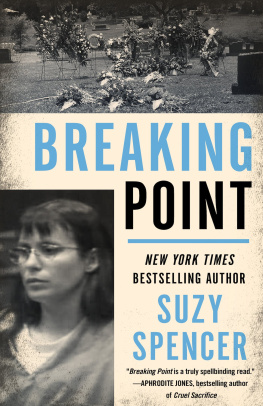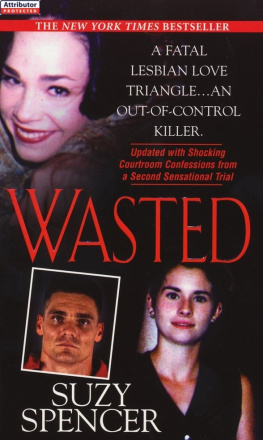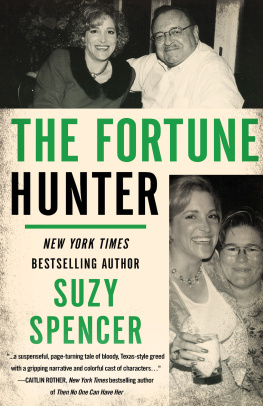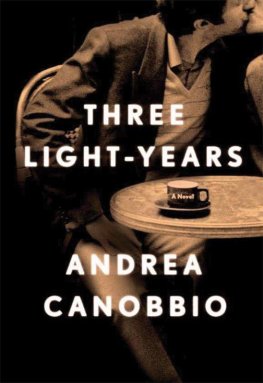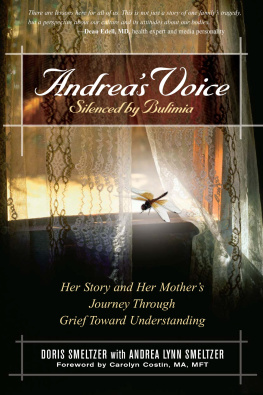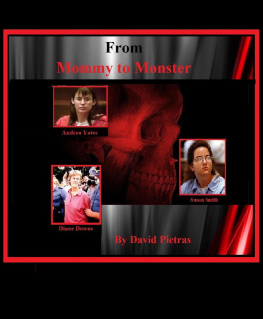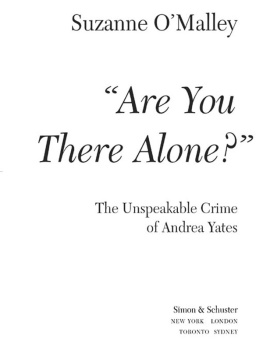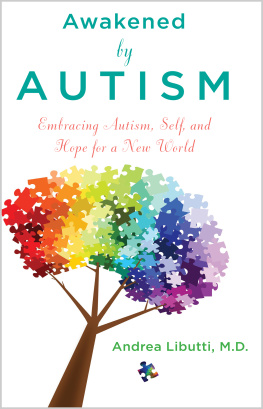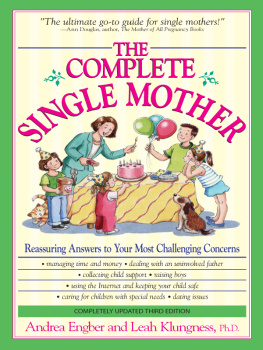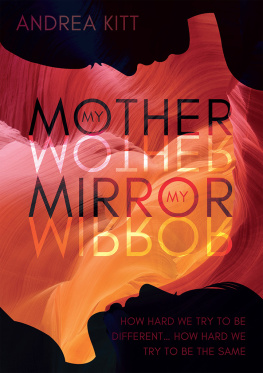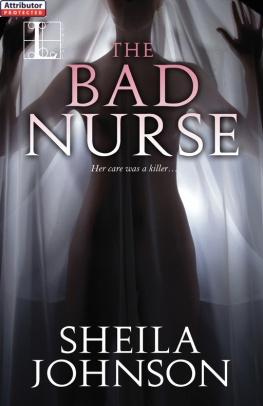Afterword
Two weeks before June 20, 2001, Andrea Pia Yates pushed a grocery cart through the local market. Rusty Yates was by her side with their children clinging to him.
That sight stopped Robert Holmes from his shopping. Holmes was married to Andreas best friend, Debbie. In all the years hed known the Yateses, hed never seen the children cling to Rusty. They were always wrapped around Andrea, the woman who fed them, diapered them, bathed them, and taught them.
But it was the scared, crazed, wild, trapped animal look in Andreas brown eyes that alarmed Holmes. Bob Holmes had known her as a friend who loved to laugh and sparkled when she did. That day, though, there was danger in her eyes.
Andreas demeanor frightened Holmes so much that it took him two days to tell his wife about the encounter. When he told Debbie, she was grateful that he did. She thought she was the only one who saw the paranoid look. Bob vowed that if he ever learned Andrea Yates was alone with her children that he was going to call Child Protective Services.
A year and a half later, Andrea Yates remained in the Skyview Unit of the Rusk State Hospital, basically isolated from the other prisoners, primarily for her own protection. She was a celebrity, and celebrity inmates were prone to attack. According to Karin Kennedy, Andreas cell was right next to the nurses station so that they could watch out for her. They are very helpful up there, Kennedy said of the prison hospital staffers.
The guards considered Andrea a model inmate, Bob Holmes said. These people have a real affection for Andrea. Bob received letters from Yates, and Debbie visited her regularly, as Karin Kennedy gave the Holmeses some of her twice-monthly visits.
In her two-hour stays with Debbie, Andrea wanted to talk about the children. During one visit, Debbie pointed out that Andrea had never had a chance to grieve over her children or her fathers death. Andrea agreed and broke into tears.
In prison, said Bob Holmes, Andrea Yates was finally going through the grieving of both her children and father. Debbie consoled Andrea by reassuring her that that her children were great.
Andrea also talked to Debbie whether God could really forgive her for what shed done. Andrea struggled with that, said Bob.
Just before Christmas 2002, Andrea was taken off her anti-psychotic Haldol, said George Parnham. When Andreas mother saw her two months later, Yates walked out and announced, Im bipolar and so are you.
Andrea, I thought I was the only sane one, Mrs. Kennedy joked. She and her daughter laughed. Yates had been diagnosed as schizophrenic while jailed in Houston. But the Rusk State Hospital doctors had a different opinion.
Mere days after that visit, Rusty Yates got a phone call from a prison official telling him Andrea had relapsed into psychosis. She was placed in isolation for several days and put back on Haldol, as well as Lithium.
By March 2003, a year after shed been convicted, Andrea Yates was doing better. She was adjusting to the medicines, and her spirits were good, according to her mother, George Parnham, and Bob Holmes. Shes slowly coming to the realization that shes ill, added Holmes. She understands now that all was upside down.
And for the first time, Andrea Yates talked about the future, telling Debbie that she wanted her to be there when Andrea was released after serving 40 years. Thats when Andrea would be eligible for parole.
Rusty Yates, however, said Andrea was doing fair. And Parnham admitted that she looked appreciably older, had lost weight, and had a chalky pallor, while her mother said the medications made Andreas face break out and she scratched at the breakouts.
But Kennedy bragged that Andrea got a new pair of eyeglasses. Hers had broken, were taped together, and slipped down her nose. Andrea was briefly taken to the womens prison in Gatesville, Texas, for the new glasses, then driven back to Rusk. It was the first time Andrea Yates had seen scenery since March 21, 2002.
By then, Andrea was attending Bible study with other prisoners, as she eventually was allowed some contact with other inmates. Occasionally, she was permitted to watch television with about eight other women prisoners. Then she was allowed to start mopping floors, a job she loved. As the weather warmed, shed be given a new job that she greatly anticipatedworking outdoors in the flowerbeds and vegetable fields. Still later, she was given another task of collecting the laundry.
Friday, March 7, 2003, Wendell Odom reported that the defense team finally had enough money to pay for the trial transcript and could proceed with an appeal. The money came from an anonymous donor. Previously, the attorneys had said their appeal would be based in part on the false testimony by Dr. Park Dietz.
She is not bitter, Odom reported. She thinks God has put her there [in prison] for a purpose and that she has a wonderful husband and beautiful children.
Rusty Yates was still married to Andrea and still working for NASA. He saw Andrea the day the space shuttle Columbia blew up and shuttle debris scattered around the prison. Andreas still very loyal to Rusty, Bob Holmes stated. She hung on to the fact that he still came to visit her and hadnt divorced her. Her children are gone, what else does she have? he asked.
However, numerous people who had contact with Andrea Yates said that within a year of her conviction, Rusty had asked her to file for divorce. She said noshe didnt believe in divorce. It was around that time, they said, that she went into psychosis.
Rusty publicly denied that hed requested the divorce, calling the idea ridiculous.
And Rusty Yates, unlike Andrea, expressed bitternessover the press, the way others were making money at his familys expense, and the way his familys tragedy was being exploited. No one, he said, had provided a reasonable explanation of what happened to his family.
The only good that came out of it, he said, was Katie Courics reporting on postpartum depression and the creation of the Yates Children Memorial Fund for Womens Mental Health Education in association with the Mental Health Association of Greater Houston. Established in 2002, the funds goal was to raise awareness about postpartum illnesses.
Andrea Yates, though, was getting support throughout the nation. According to her mother, approximately 80 people including people in Maine, Massachusetts, and everywhere regularly wrote to Andrea and sent her magazine subscriptions.
Andrea wrote them all back.
Around the third anniversary of the childrens death, Rusty Yates told Andrea he was going to file for divorce. She again went into psychosis and nearly died from her refusal to eat. But by early 2005, Rusty had filed, Andrea was doing better, and the Court of Appeals for the First District of Texas reversed Yates capital murder conviction solely citing Park Dietzs false testimony. The prosecution vowed to fight the reversal. And Andrea Yates remained in prison.
On, March 18, 2006, Rusty Yates married Laura Arnold in front of 100 friends and family at the Clear Lake Church of Christ, the same church that had hosted his childrens funeral. Arnold, a 41-year-old blonde mother of two waslike Rustya NASA engineer and Clear Lake Church of Christ member. After the wedding, the newlyweds drove away in a red Corvette.
On July 26, 2006, after a four week retrial, and thirteen hours of deliberation, a Harris County jury found Andrea Yates not guilty by reason of insanity. Rusty Yates was in the courtroom when the verdict was read. He and Andrea both wept.
March 20, 2008, Rusty and his second wife had a baby. It was a boy.
On October 12, 2009, Rusty posted on his website yatescase.org, Sorry that I havent had any posts lately. Ive been busy with my new family, including my son, Mark Yates, who is about 1-1/2 years old now. He is such a blessing.

